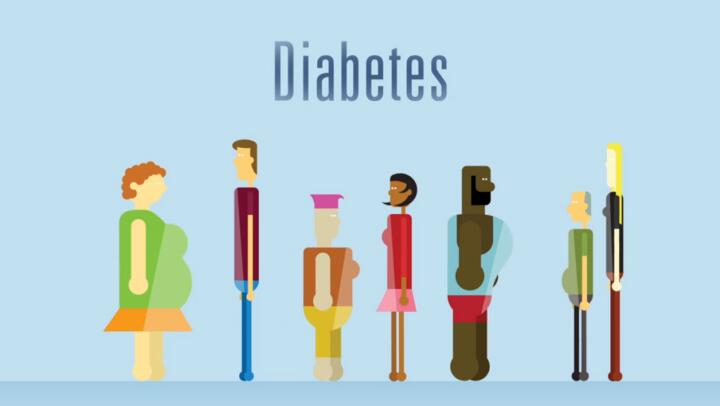Read on to learn more about endocrine disorders, what causes them, and how doctors treat them.
Sex and gender terms
Sex and gender exist on spectrums. This article will use the terms “females” and “males” to refer to a person’s sex assigned at birth.
What is the endocrine system?

The endocrine system regulates the release of hormones into the bloodstream. These hormones are important for many bodily processes, such as reproduction, metabolism, and growth.
The endocrine system consists of the following.
- Pituitary gland: This is a small gland at the base of your brain that releases hormones affecting the functions of many other glands in your body.
- Thyroid gland: This gland in your neck helps regulate metabolism and growth.
- Parathyroid glands: These glands are located behind the thyroid gland. They release a hormone that regulates the level of calcium in your blood.
- Adrenal glands: These glands control many bodily functions, including blood pressure and heart rate. They are located near your kidneys.
- Pineal gland: This gland produces melatonin, which helps regulate your sleep cycle.
- Hypothalamus: This part of the brain regulates hunger, thirst, and body temperature. It also secretes hormones that signal the pituitary gland to release hormones.
- Pancreas: This organ helps regulate digestion and produces insulin, which helps regulate your blood sugar levels.
- Thymus: This gland makes hormones involved in producing white blood cells, which help your body fight infections.
- Testes: These glands produce sperm and testosterone.
- Ovaries: These glands produce eggs, estrogen, and progesterone.
Endocrinology is the study of the endocrine system, and endocrinologists are experts in diagnosing and treating endocrine disorders.
Below are nine common endocrine disorders and their causes, symptoms, diagnosis, and treatment options.
Diabetes
Diabetes occurs when your pancreas cannot produce enough insulin or your body cannot use it properly. Diabetes results in your bloodstream containing too much glucose, which can lead to many serious health problems. It is the most common endocrine disorder in the United States.
There are three main types of diabetes:
- Type 1 diabetes: Your body does not make insulin.
- Type 2 diabetes: Your body cannot make or use insulin properly.
- Gestational diabetes: Some people develop this condition during pregnancy. It usually goes away after the baby is born, but it can increase the risk of developing type 2 diabetes in the future.
Causes
You develop type 1 diabetes when your immune system interferes with the ability of your pancreas to produce insulin. Although why this happens is not known, scientists think that genetics and environmental factors may play a role.
Many factors — including genetics, lifestyle factors, and the body’s inability to use insulin properly — can cause type 2 diabetes.
Experts believe that hormonal changes during pregnancy, along with genetics and lifestyle factors, can cause gestational diabetes.
Symptoms
Common symptoms of diabetes include excessive hunger or thirst, fatigue, and unexplained weight loss.
Learn more about the symptoms of diabetes here.
Diagnosis
There are a few tests that doctors can use to diagnose type 1 and type 2 diabetes.
- A1C test: This test measures your average blood glucose level over 3 months.
- Fasting plasma glucose test: This test measures the glucose level in your blood after you have been fasting for a certain period of time, usually 8 hours.
- Random plasma glucose test: If doctors do not want to delay testing until after you have fasted, they may measure your blood glucose level immediately with this test.
To diagnose gestational diabetes, doctors may use two tests that measure how well your body uses glucose.
- Glucose challenge test: This test requires you to drink a liquid containing glucose. An hour later, a doctor will draw your blood to measure the glucose level.
- Oral glucose tolerance test: You will have your blood drawn every hour for 2–3 hours, and you will drink a liquid containing glucose between blood draws.
Treatment
Treatment for diabetes will vary depending on which type of diabetes you have. Insulin, medications, and lifestyle changes are usually required to manage diabetes.
Hyperthyroidism
Hyperthyroidism, or overactive thyroid, occurs when your thyroid gland makes more thyroid hormones than your body needs to function.
Causes
The causes of hyperthyroidism include:
- Graves’ disease
- thyroiditis, or inflammation of the thyroid gland
- too much iodine in your blood
- too much thyroid hormone medication
- overactive thyroid nodules
- noncancerous tumors on the pituitary gland
Symptoms
Common symptoms of hyperthyroidism include an enlarged thyroid gland, difficulty sleeping, and rapid heart rate.
Learn more about the symptoms of hyperthyroidism here.
Diagnosis
After examining your symptoms and medical history, doctors can use a few tests to diagnose hyperthyroidism.
- Blood tests: These tests will allow doctors to measure your thyroid hormone levels.
- Ultrasound: Doctors may use an ultrasound scan to find thyroid nodules.
- Radioactive iodine uptake test: This test measures how much iodine your thyroid is using to make hormones. Graves’ disease and overactive thyroid will cause your thyroid to take up more iodine than usual. Doctors will then use a thyroid scan to analyze how and where the iodine is distributed in your thyroid gland.
Treatment
Graves’ disease treatment typically consists of medications, thyroid surgery, and radioiodine therapy. Radioiodine therapy slowly prevents the thyroid from producing hormones, leading to hypothyroidism, which is easier to treat. The surgical removal of part or all of the thyroid also leads to hypothyroidism.
Hypothyroidism
Hypothyroidism, or underactive thyroid, occurs when your thyroid gland makes fewer thyroid hormones than your body needs.
Causes
Some of the most common causes of hypothyroidism include:
- Hashimoto’s disease
- the removal of all or part of the thyroid gland
- radiation therapy applied to the thyroid
- some medications
- thyroiditis
Symptoms
Common symptoms of hypothyroidism include cold intolerance, muscle and joint pain, and dry skin.
Learn more about the symptoms of hypothyroidism here.
Diagnosis
Doctors will typically diagnose hypothyroidism using the same tests as hyperthyroidism. These tests include ultrasound scans and blood tests.
Treatment
Treatment for hypothyroidism involves replacing the hormones that your thyroid cannot make. One of the most common medications that doctors prescribe is levothyroxine, which is a synthetic hormone that replaces the hormone your thyroid would usually make.
Graves’ disease
Graves’ disease is an autoimmune disorder that causes your immune system to interfere with your thyroid gland. When this happens, your thyroid gland will make more thyroid hormones than usual, resulting in hyperthyroidism.
Causes
Researchers do not know exactly what causes Graves’ disease. They think that a combination of genetics and environmental factors, such as a virus, can cause the disorder.
Symptoms
Common symptoms of Graves’ disease include blurred vision, heat intolerance, and tremors.
Learn more about the symptoms of Graves’ disease here.
Diagnosis
The tests to diagnose Graves’ disease include the same tests that can diagnose hyperthyroidism: radioactive iodine uptake tests, thyroid scans, and blood tests.
Doctors can also perform a Doppler blood flow measurement, which measures the blood flow in your thyroid. Graves’ disease will cause increased blood flow.
Antibody testing can also confirm the diagnosis. If your immune system is causing your thyroid to become overactive, there will be antibodies in your blood.
Treatment
To determine the best treatment option for Graves’ disease, your doctor will consider your overall health along with other factors, such as your age and symptoms.
Like hyperthyroidism, Graves’ disease treatment typically consists of medications, thyroid surgery, and radioiodine therapy.
Hashimoto’s disease
Hashimoto’s disease, also known as Hashimoto’s thyroiditis, is an autoimmune disorder wherein your immune system interferes with your thyroid gland function. This causes your thyroid gland to reduce or stop the production of thyroid hormones, which can result in hypothyroidism.
Causes
Although the exact cause of Hashimoto’s disease is not clear, researchers believe that genetics and viruses such as hepatitis C may play a role.
Symptoms
Some common symptoms of Hashimoto’s disease include weight gain, constipation, and thinning hair.
Learn more about the symptoms of Hashimoto’s disease here.
Diagnosis
To diagnose Hashimoto’s disease, your doctor will perform a physical exam and discuss your medical history with you. They may also order some blood tests to check your thyroid hormone levels.
If doctors need an additional test to confirm the diagnosis, they may perform an ultrasound scan or antibody testing.
Treatment
Treatment for Hashimoto’s disease depends on whether your thyroid gland is damaged enough to cause hypothyroidism. If it is, doctors will typically prescribe levothyroxine.
Cushing’s syndrome
Cushing’s syndrome happens when your body produces too much cortisol. Cortisol is a hormone that helps your body respond to stress, reduce inflammation, and regulate your body’s sugar level.
Causes
Causes of Cushing’s syndrome include:
- overuse of glucocorticoids, which are medications that treat inflammation and autoimmune disorders
- certain benign or cancerous tumors that cause your body to make too much cortisol
Symptoms
Common symptoms of Cushing’s syndrome include weak muscles, a round face, and thin arms and legs.
Learn more about the symptoms of Cushing’s syndrome here.
Diagnosis
After looking at your medical history and performing a physical exam, doctors diagnose Cushing’s syndrome by measuring the level of cortisol in your urine, saliva, and blood. Elevated levels of cortisol are key to diagnosing Cushing’s syndrome.
Treatment
Treatment for Cushing’s syndrome will vary depending on the cause.
If the overuse of glucocorticoids is causing the disorder, your doctor will reduce your dosage to the lowest level possible or find another type of medication that works instead.
If a tumor is causing Cushing’s syndrome, a healthcare professional may remove the tumor surgically or treat it with radiation therapy.
Addison’s disease
Addison’s disease occurs when your adrenal glands do not make enough hormones for your body’s needs. This lack of cortisol is also known as adrenal insufficiency.
Causes
The causes of Addison’s disease include:
- damage to your adrenal glands as a result of an autoimmune disorder
- certain infections, such as tuberculosis
- a weakened immune system resulting from HIV or AIDS
- the removal of the adrenal glands
- bleeding into the adrenal glands
- cancer in the adrenal glands
- the use of certain antifungal medications
Symptoms
Common symptoms of Addison’s disease include diarrhea, darkening of the skin, and low blood sugar.
Learn more about the symptoms of Addison’s disease here.
Diagnosis
There are a few tests that doctors can use to diagnose Addison’s disease, including:
- Cortisol testing: Doctors will test your blood cortisol levels. If the levels are low, they may test your adrenal glands’ ability to respond to an injection of a synthetic pituitary hormone called adrenocorticotrophic hormone.
- CT scan: This scan can help doctors look for changes in your adrenal glands. Your glands may be smaller or larger than usual, depending on what is causing the disease.
- Antibody blood tests: These tests will show if you have antibodies in your blood as a result of an infection or an autoimmune disorder.
- Tuberculosis tests: To check for tuberculosis, doctors may use chest X-rays, urine tests, or skin tests.
Treatment
To replace the cortisol that your adrenal glands are unable to make, doctors will typically prescribe a corticosteroid called hydrocortisone. Your dosage may need to be adjusted if you are pregnant, ill, or injured or if you need to undergo surgery.
Acromegaly
Acromegaly occurs when your body produces too much growth hormone (GH), which regulates your physical growth. The pituitary gland is the main producer of GH.
Causes
The most common cause of acromegaly is a pituitary gland tumor called a pituitary adenoma. These tumors are almost always benign, and they can grow slowly or rapidly. The exact cause of pituitary gland tumors is unknown, but scientists believe that genetics may play a role.
Symptoms
Common symptoms of acromegaly include large or swollen hands and feet, bone changes in the face, and a deepening voice.
Learn more about the symptoms of acromegaly here.
Diagnosis
The main tests that doctors use to diagnose acromegaly are:
- Insulin-like growth factor (IGF) test: This test measures the levels of IGF in your blood. IGF is a hormone produced by your liver that causes bone and tissue to grow. The level of IGF in your blood is directly related to the GH level.
- Oral glucose tolerance test: This test requires you to drink a liquid containing glucose before having your blood tested at half-hour intervals. Sugar typically causes GH levels to decrease. If they do not decrease, it may indicate acromegaly.
If these tests confirm increased GH levels, your doctor may order an MRI scan or a CT scan to locate the tumor that may be causing acromegaly.
Treatment
The main treatments for acromegaly are surgery to remove the tumor, radiation therapy to remove tumor cells, and medications to balance out your IGF and GH levels. Your treatment plan will vary based on your overall health, age, and symptoms.
Polycystic ovary syndrome
Polycystic ovary syndrome (PCOS) occurs when a female’s body produces excess androgens, or male hormones.
Causes
The exact cause of PCOS is not known. Some potential factors that may contribute to the development of PCOS include:
- a family history of PCOS
- insulin resistance
- high insulin levels
- a low birth weight
- rapid weight gain after birth
- excess weight in childhood and adulthood
- an unhealthy lifestyle
Symptoms
Common symptoms of PCOS include infertility, irregular periods, and cysts in the ovaries.
Learn more about the symptoms of PCOS here.
Diagnosis
To diagnose PCOS, your doctor will examine your medical history and perform a physical examination. They may also perform tests such as:
- blood tests to assess your hormone levels
- an ovarian ultrasound scan
- a glucose tolerance test
Treatment
PCOS is not currently curable, but there are options available that can help treat the symptoms. These include:
- medications to treat hormone imbalances
- medications to help your body use insulin properly
- fertility drugs
- certain lifestyle and diet changes
Summary
Endocrine disorders occur when the endocrine system does not function properly, resulting in hormone imbalances. These disorders can cause a variety of symptoms, depending on which glands or organs are involved.
Treatments include medications to correct hormone imbalances, surgical procedures, and lifestyle changes.
Talk with your doctor if you think that you may have an endocrine disorder.





























